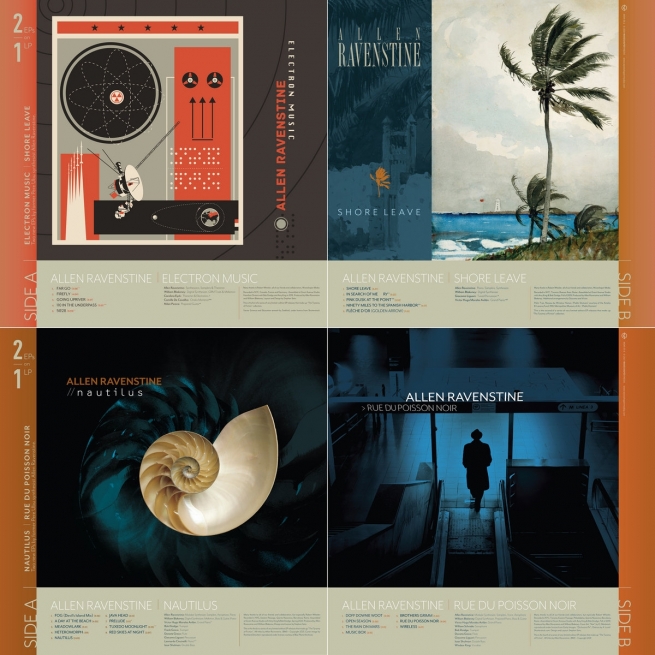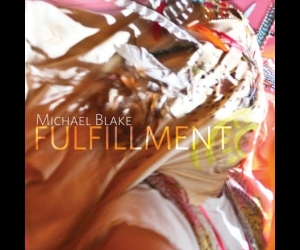
Allen Ravenstine is best known as the synth player of Cleveland proto-punk band Pere Ubu, yet his experimental work predates their 1975 debut single. When Pere Ubu pressed pause after its first two decades, Ravenstine stepped away from music to earn a pilot’s licence and focus on writing novels. In 2012, the filmmakers of the synth documentary I Dream of Wires from Toronto’s Waveshaper Media invited Ravenstine to collaborate with Pere Ubu’s current keyboardist Robert Wheeler. This encounter reopened Ravenstine’s creative floodgates, culminating in The Tyranny of Fiction, a collection of four EPs spanning over two hours of fragmented chamber pop, moody electro-jazz, and mesmerizing sound collage.
The Tyranny of Fiction was recorded around the world with a lengthy list of instrumental contributors, then reassembled by Ravenstine and coproducer William Blakeney at Hamilton’s Grant Avenue Studio. Blakeney’s presence is felt immediately with his gorgeous Mellotron playing on “Far Go,” the wistful opener to the Electron Music EP, first of the four. The next track, “Firefly,” initially swerves into orchestral territory until guttural gurgles evoke an insect’s point of view. On the closing track “5@28,” trumpeting tones herald the arrival of theremin virtuoso Carolina Eyck, before her squelches are completely subsumed.
Shore Leave is noticeably melodic in comparison to the first EP. Ravenstine adds pensive piano to its opening title track, then vacates his seat for Victor Hugo Morales Avilán on the solo grand spotlight “Ninety Miles to the Spanish Harbor.” Giacomo Liguori’s chiming metallophones on “In Order of Memory” (and the subsequent EP’s “Moonlight Marimba”) will appeal to fans of Japanese percussionist Midori Takada. “Flèche d’Or” (Golden Arrow) is propelled by puffing trains instead of the earlier songs’ tuned percussion, conjuring a mood reminiscent of The KLF’s pastoral ambient masterpiece Chill Out.
The songs on Nautilus, the third EP, are infused with field samples. A jaunty accordion jig is overlaid with lapping waves and crying seagulls on the opener “Fog (Devil’s Island Mix).” The laid-back “A Day at the Beach” drifts through echoing voicemail messages, crackling fireworks, and upstroking reggae. The curiously titled “Java Head” introduces synthesized harpsichord reminiscent of Oneohtrix Point Never, before “Red Skies at Night” ends the EP with another ominous collision of strings and electronics.
On the final EP, Rue Du Poisson Noir, “Doff Downie Woot” flips the mood yet again with gently recited nonsense syllables and playful electronic chamber pop. “Open Season” and “Wireless” continue with this approach, adding bursts of jazzy instrumentation, rippling arpeggios, and the disembodied voices of both humans and animals. Unfortunately, some of this EP’s shorter sketches fall on the wrong side of cheesy, such as the dinky MIDI horns of “Rear Window” and the spooky organs of “Brothers Grimm,” which most closely resemble stock music for a Halloween costume commercial. On the other hand, “Rue du Poisson Noir” is one of the most spellbinding songs of the entire set, with William Schrade’s sax, Issar Shulman’s double bass, and Blakeney’s bluesy guitar licks drifting through space jazz at cocktail hour.
Blakeney deserves accolades for the vital new work he is coaxing out of underground icons. He oversaw the recent retrospective compilations from Canadian synth hero John Mills-Cockell, as well as Intersystems’ 2021 release #4, which features new work from that late ’60s group of Mills-Cockell’s. Ravenstine’s wandering electronic art-pop no longer resembles Pere Ubu—or any band for that matter—thus displacing this compelling collection of music from a recognizable time or place.


